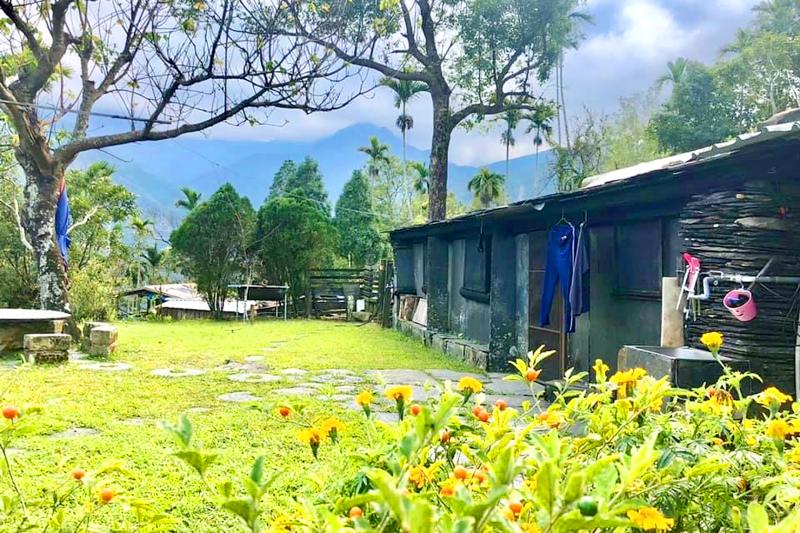The Pingtung County Government earlier this week approved Majia Township’s (瑪家) request to build a special path to the remnants of Payuan Village (筏灣) and recognize it as a cultural asset.
Designating Payuan as a cultural asset would help it develop as a tourism hotspot for Aboriginal culture, the county government said.
Payuan is one of four original Aboriginal villages in Pingtung County and 17 nationwide.

Photo courtesy of Democratic Progressive Party Legislator Wu Li-hua
Payuan is one of the places where Paiwan culture originated, but the government in 1974 moved its residents to Payuwan Village (排灣), citing their lack of access to education and medical facilities.
The residents of Payuwan said that in 2001 they rediscovered their connection to Payuan and began to repair the stone slab houses.
They avoided using cement, pipes and power line poles to maintain the village’s original pristine look, the residents added.
Twelve houses have been restored, the residents said, adding that they hope to eventually restore 20.
A ceremony must be held to tell the ancestral spirits that it is their descendants who are returning to the village, they said.
Separately, Majia Township on Thursday held a ceremony to mark the end of training for its first group of local tour guides, which saw 26 Aborigines receive certificates and tour guide badges.
Majia Township Warden Liang Ming-hui (梁明輝) said that the rise in popularity of Hayou River (哈尤溪) and the hot springs in nearby Wutai Township (霧台) has steadily attracted tourists to the region.
However, the village lacked uniformity regarding fees and transparency in how the funds were used, Liang said, adding that the varying quality of service at local lodges was also brought to light.
To avoid Payuan repeating Majia’s mistakes, a course was established to train local guides, Liang said, adding that the township would only allow tours that have made reservations to help control the number of people entering Payuan.

The Chinese military has built landing bridge ships designed to expand its amphibious options for a potential assault on Taiwan, but their combat effectiveness is limited due to their high vulnerability, a defense expert said in an analysis published on Monday. Shen Ming-shih (沈明室), a research fellow at the Institute for National Defense and Security Research, said that the deployment of such vessels as part of the Chinese People’s Liberation Army (PLA) Navy’s East Sea Fleet signals a strong focus on Taiwan. However, the ships are highly vulnerable to precision strikes, which means they could be destroyed before they achieve their intended

The first two F-16V Bock 70 jets purchased from the US are expected to arrive in Taiwan around Double Ten National Day, which is on Oct. 10, a military source said yesterday. Of the 66 F-16V Block 70 jets purchased from the US, the first completed production in March, the source said, adding that since then three jets have been produced per month. Although there were reports of engine defects, the issue has been resolved, they said. After the jets arrive in Taiwan, they must first pass testing by the air force before they would officially become Taiwan’s property, they said. The air force

GLOBAL: Although Matsu has limited capacity for large numbers of domestic tourists, it would be a great high-end destination for international travelers, an official said Lienchiang County’s (Matsu) unique landscape and Cold War history give it great potential to be marketed as a destination for international travelers, Tourism Administration Director General Chen Yu-hsiu (陳玉秀) said at the weekend. Tourism officials traveled to the outlying island for the Matsu Biennial, an art festival that started on Friday to celebrate Matsu’s culture, history and landscape. Travelers to Matsu, which lies about 190km northwest of Taipei, must fly or take the state-run New Taima passenger ship. However, flights are often canceled during fog season from April to June. Chen spoke about her vision to promote Matsu as a tourist attraction in

PAWSITIVE IMPACT: A shop owner said that while he adopted cats to take care of rodents, they have also attracted younger visitors who also buy his dried goods In Taipei’s Dadaocheng (大稻埕), cats lounging in shops along Dihua Street do more than nap amid the scent of dried seafood. Many have become beloved fixtures who double as photography models, attracting visitors and helping boost sales in one of the capital’s most historic quarters. A recent photo contest featuring more than a dozen shop cats drew more than 2,200 submissions, turning everyday cat-spotting into a friendly competition that attracted amateur and professional photographers. “It’s rare to see cats standing, so when it suddenly did, it felt like a lucky cat,” said Sabrina Hsu (徐淳蔚), who won the NT$10,000 top prize in